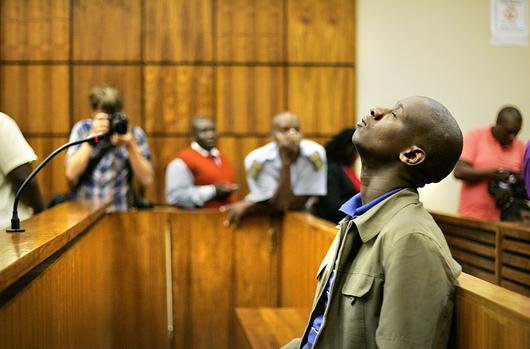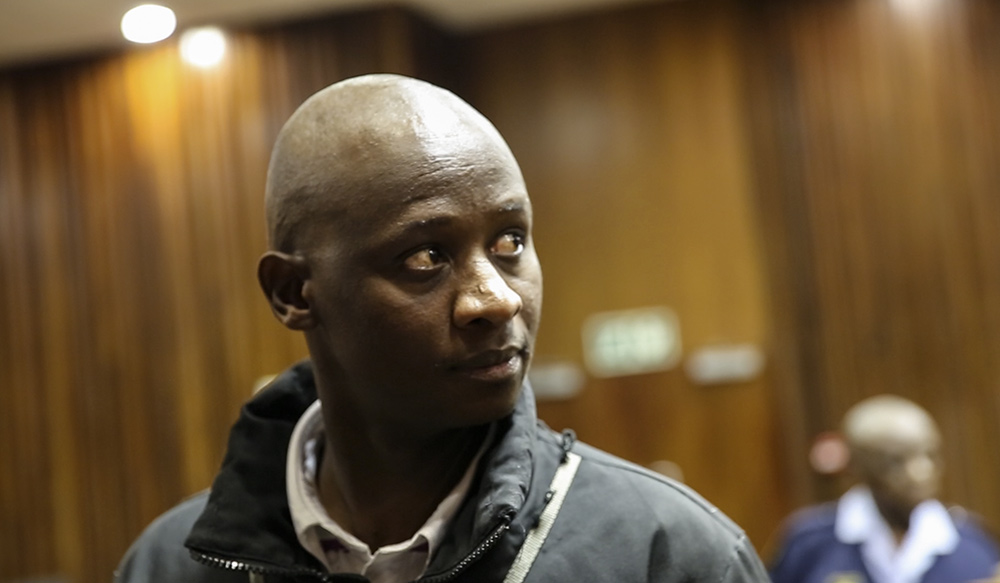Patrick Wisani’s sentencing to 20 years in prison is little consolation for the loss of the life of a young woman, Nosipho Mandleleni, and the protracted case has only served to highlight the failures of the system in protecting women against gender-based violence in South Africa, writes Thabang Pooe and Nonhlanhla Skosana.
At one point during the trial, Judge Mohamed Ismail commented that Wisani’s attack on Nosipho was so malicious, that he “beat her like a master would a slave.” Wisani sjambokked 24-year-old Nosipho to death.
On Thursday, May 11, in the high court in Joburg, Judge Mohamed Ismail sentenced Wisani to 20 years in prison for the murder.

The former ANCYL Youth League official was also handed one year each for intimidation and assault. The sentences will run concurrently.
To those who have tracked this case from the start, one thing is clear: the South African criminal justice system did not attain justice for Nosipho and her family – activists did.
Marred by shoddy investigation from the start, it was left to civil society members including Sonke Gender Justice, Awethu!, Peace and Justice, Lawyers for Human Rights, People Opposing Women Abuse, and the Inner City Women’s Forum, to hold the system to account and provide much-needed support to the Mandleleni family.
Our system is not designed to adequately deal with cases of violence against women. Our system failed Nosipho Mandleleni. And it will continue to fail more women like her if these breakdowns are not addressed.
Wisani has been known to have a history of aggression against women, in fact on September 13, 2015, an article detailing Wisani’s alleged assault history was published by one of the newspapers. While serving as the head of the Yeoville Community Policing Forum (CPF), it emerged that a case of assault with intent to commit grievous bodily harm had been opened against him. It is alleged that he had publicly beaten a woman, in public, so badly that she lapsed into a coma for three weeks.
Activists brought this case to the attention of the forum, demanding his suspension. Although some members tried to defend Wisani, at the persistence of community activists, he was removed as the CPF head.
The assault was reported to the Yeoville police, yet no case number was issued and no investigation was launched.
Had that assault case been taken seriously by police, Wisani may never have had an opportunity to end Nosipho’s life.
Wisani handed himself over to the police on the Monday following Nosipho’s murder. Bail proceedings commenced two weeks later. During the hearing, the magistrate publicly reprimanded the police for their poor investigation, highlighting a docket which lacked crucial details of how the murder happened and where.
Activists, fearing a poor and sluggish investigation and concerned about Wisani’s connections with the police, took action. They mobilised the community and engaged with the police and the prosecution.
In so doing they cast a critical eye over proceedings and demanded accountability.
Wisani was granted bail of R3000 on condition that he did not return to Yeoville or interfere with witnesses.
A charge of rape in January 2016 last year failed to concern him; instead, he applied to have his bail conditions relaxed.
The rape charge would be dropped the following month.
In the background activists furiously wrote letters to the ANC, informing the organisation of the case and demanding Wisani’s suspension from the party. He was duly suspended from all activities.
Then in May, while on bail, Wisani slapped and dragged Nosipho’s sister, Siphokazi when she and a friend left a club in Doornfontein.
Siphokazi told police how he had demanded that she withdraw the murder charge against him. If she testified, he would kill her – just like he did her twin sister.
After the assault, Siphokazi laid charges of assault and intimidation against Wisani at the Yeoville police station and the state filed a motion to have his bail revoked.
When Wisani and his legal representative failed to appear on the date of the application hearing, an immediate warrant of arrest was issued.
On August 1, 2016 last year, Wisani appeared in court without adequate legal representation. The case was postponed so as to give him and his newly appointed legal team time to prepare. When the case resumed, it became clear that the judge was incompetent.
He couldn’t remember basic facts and often referred to the accused as the defendant. His conduct was going to have serious implications for the case and activists were worried that if Wisani was found guilty, there would be legitimate grounds for appeal.
The prosecution requested that the judge recuse himself and the defence supported the motion.
Activists ensured that the recusal and the conduct of the judge was brought to the attention of the Judge President. The advocacy by the activists played an important role in ensuring the case was allocated to a competent judge who would perform his/her duties.
Despite Wisani moving through a number of legal representatives and finally settling on representing himself, the murder trial eventually got under way.
Throughout, activists continued to support Nosipho’s family and ensure community presence at every hearing.
On December 12, 2016 last year, Judge Ismail found Wisani guilty of murder. He was also found guilty of assault and intimidation for threatening Nosipho’s twin sister. And on May 11, 2017, he was sentenced to 20 years in prison plus one year each for intimidation and assault.
Wisani is one of tens of thousands of men who have perpetrated violence against women in South Africa in the past year.
And similarly, Nosipho’s tragic death is one among many.
One in three women in South Africa is a victim of domestic violence and a woman is killed every eight hours by her partner.
Dealing with this crisis of violence requires a concerted effort by government – at all levels – to address the causes of domestic and sexual violence.
Furthermore, government needs to critically look at barriers to reporting and systemic failures in the criminal justice system with a view to fix and strengthen these institutions so that victims have the necessary confidence to report domestic and sexual violence knowing their cases will be adequately dealt with.
For this reason, Sonke continues to call on government to develop and implement a fully costed national plan that provides vital services to survivors, holds perpetrators to account and prevents violence before it happens.
In the meantime, it falls to civil society to plug the deep gaps in the system. Without the tireless efforts of the Yeoville community as well as committed activists, the many systemic breakdowns would not have been adequately addressed and justice for Nosipho may never have been realised.








